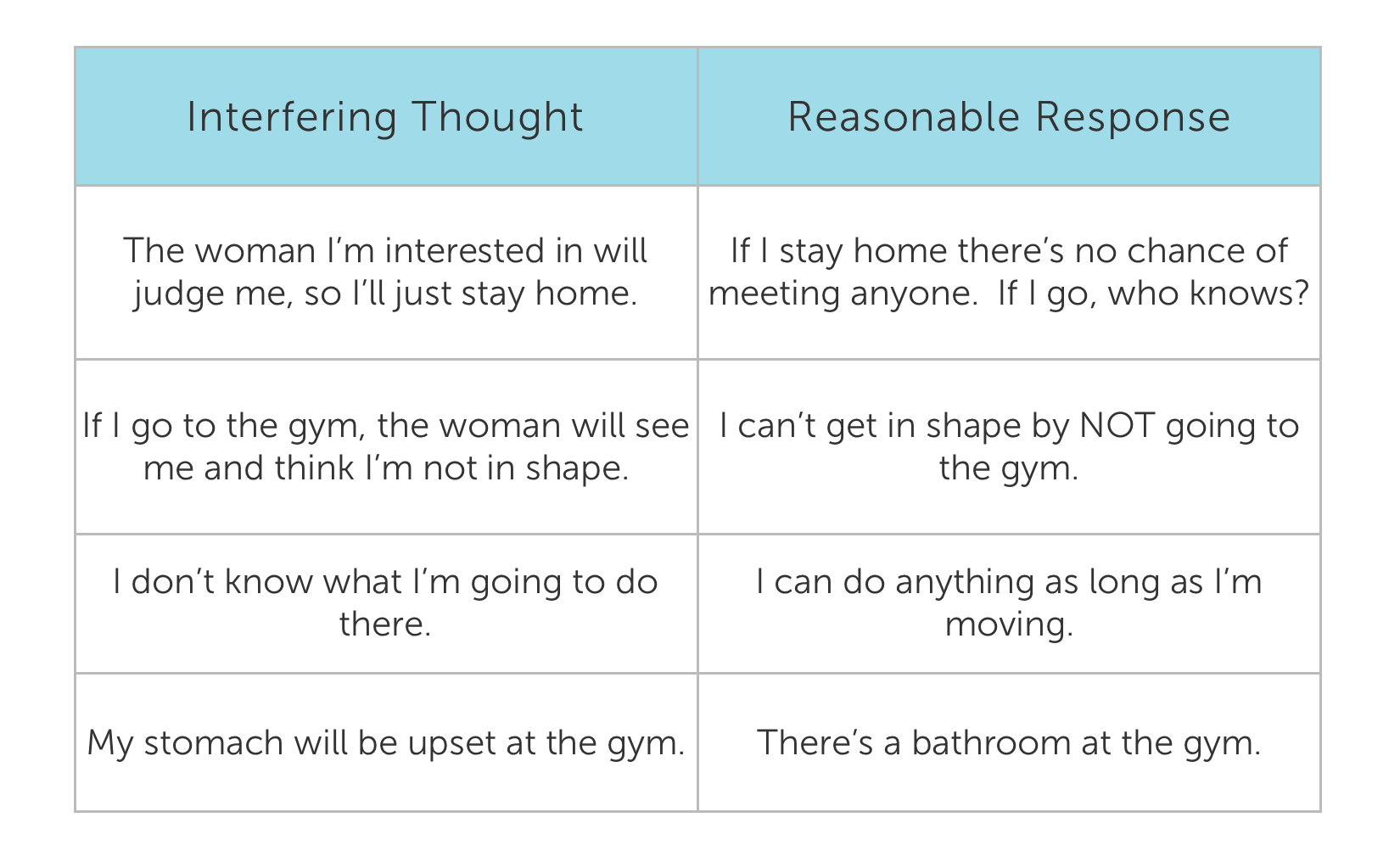Applications for the Beck Institute Certified Master Clinician program are open! Learn more .
- All Conditions

The New “Homework” in Cognitive Behavior Therapy

By Judith S. Beck, Ph.D., and Francine R. Broder, Psy.D.

We’ve stopped using the word “homework” in CBT. Too many clients take exception to that term. It reminds them of the drudgery of assignments they had to do at home when they were at school. So in recent times, we’ve switched. “Homework” is now called the “Action Plan.”
We like the label “Action Plan.” It conveys a sense of proactivity, of taking control.

Action plans aren’t optional. They are very carefully created, in a collaborative fashion. Therapists emphasize that most of the work in getting better happens between sessions. A significant part of each session involves helping clients figure out what they need to do outside of the therapy office to feel better and regain a good level of functioning. We tell clients:

That’s why we make sure that whatever is important for the client to remember about the session, including their Action Plan, is recorded, written down or entered as text or audio into an electronic device.
And that’s why, after we’ve finished collaboratively creating the Action Plan, we ask:
How likely are you to do this assignment(s) this week?
And that’s why we continue talking about potential obstacles that could get in the way when clients say they are 90% or less likely to complete the Action Plan.
Here is an example of a client who did not do his action plan, and this is how we worked on it.
A 28-year-old came to treatment to work on reducing depression, social anxiety, and worry about his irritable bowel syndrome. During our session, he identified “getting into shape” as important to him and set up a specific action plan that included going to the gym he belonged to, two times during the week, for approximately 30 minutes. Upon returning the following week and checking in on how it went, he stated he did not go. When asked what got in his way, he stated he did not know. He was asked to go back to an earlier time in the week, imagine himself about to go to the gym, and to notice the thoughts that were going through his mind. Using imagery, he was able to identify his interfering thoughts. Next, we used Socratic questioning, summarizing his conclusions in a two-column thought record.

The Action Plan isn’t optional. A considerable body of evidence shows that clients who do homework have better outcomes than clients who do not. See, for example Conklin & Strunk (2015); Kazantzis, Deane, Ronan & L’Abate (2005). It’s up to therapists to help clients carefully design meaningful assignments with a good likelihood of success and to motivate clients to follow through. Finally, we used the two-column thought record to anticipate additional interfering thoughts that could get in the way of engaging in his action plan for the coming week.
Conklin, L. R., & Strunk, D. R. (January 01, 2015). A session-to-session examination of homework engagement in cognitive therapy for depression: Do patients experience immediate benefits? . Behaviour Research and Therapy, 72, 56-62.
Kazantzis, N., & L’Abate, L. (2006). Handbook of homework assignments in psychotherapy: Research, practice, and prevention . New York, NY: Springer.
- Bipolar Disorder
- Therapy Center
- When To See a Therapist
- Types of Therapy
- Best Online Therapy
- Best Couples Therapy
- Managing Stress
- Sleep and Dreaming
- Understanding Emotions
- Self-Improvement
- Healthy Relationships
- Student Resources
- Personality Types
- Guided Meditations
- Verywell Mind Insights
- 2024 Verywell Mind 25
- Mental Health in the Classroom
- Editorial Process
- Meet Our Review Board
- Crisis Support
What Is Therapy Homework?
Sanjana is a health writer and editor. Her work spans various health-related topics, including mental health, fitness, nutrition, and wellness.
:max_bytes(150000):strip_icc():format(webp)/SanjanaGupta-d217a6bfa3094955b3361e021f77fcca.jpg)
Dr. Sabrina Romanoff, PsyD, is a licensed clinical psychologist and a professor at Yeshiva University’s clinical psychology doctoral program.
:max_bytes(150000):strip_icc():format(webp)/SabrinaRomanoffPhoto2-7320d6c6ffcc48ba87e1bad8cae3f79b.jpg)
Astrakan Images / Getty Images
Types of Therapy That Involve Homework
If you’ve recently started going to therapy , you may find yourself being assigned therapy homework. You may wonder what exactly it entails and what purpose it serves. Therapy homework comprises tasks or assignments that your therapist asks you to complete between sessions, says Nicole Erkfitz , DSW, LCSW, a licensed clinical social worker and executive director at AMFM Healthcare, Virginia.
Homework can be given in any form of therapy, and it may come as a worksheet, a task to complete, or a thought/piece of knowledge you are requested to keep with you throughout the week, Dr. Erkfitz explains.
This article explores the role of homework in certain forms of therapy, the benefits therapy homework can offer, and some tips to help you comply with your homework assignments.
Therapy homework can be assigned as part of any type of therapy. However, some therapists and forms of therapy may utilize it more than others.
For instance, a 2019-study notes that therapy homework is an integral part of cognitive-behavioral therapy (CBT) . According to Dr. Erkfitz, therapy homework is built into the protocol and framework of CBT, as well as dialectical behavior therapy (DBT) , which is a sub-type of CBT.
Therefore, if you’re seeing a therapist who practices CBT or DBT, chances are you’ll regularly have homework to do.
On the other hand, an example of a type of therapy that doesn’t generally involve homework is eye movement desensitization and reprocessing (EMDR) therapy. EMDR is a type of therapy that generally relies on the relationship between the therapist and client during sessions and is a modality that specifically doesn’t rely on homework, says Dr. Erkfitz.
However, she explains that if the client is feeling rejuvenated and well after their processing session, for instance, their therapist may ask them to write down a list of times that their positive cognition came up for them over the next week.
"Regardless of the type of therapy, the best kind of homework is when you don’t even realize you were assigned homework," says Erkfitz.
Benefits of Therapy Homework
Below, Dr. Erkfitz explains the benefits of therapy homework.
It Helps Your Therapist Review Your Progress
The most important part of therapy homework is the follow-up discussion at the next session. The time you spend reviewing with your therapist how the past week went, if you completed your homework, or if you didn’t and why, gives your therapist valuable feedback on your progress and insight on how they can better support you.

It Gives Your Therapist More Insight
Therapy can be tricky because by the time you are committed to showing up and putting in the work, you are already bringing a better and stronger version of yourself than what you have been experiencing in your day-to-day life that led you to seek therapy.
Homework gives your therapist an inside look into your day-to-day life, which can sometimes be hard to recap in a session. Certain homework assignments keep you thinking throughout the week about what you want to share during your sessions, giving your therapist historical data to review and address.
It Helps Empower You
The sense of empowerment you can gain from utilizing your new skills, setting new boundaries , and redirecting your own cognitive distortions is something a therapist can’t give you in the therapy session. This is something you give yourself. Therapy homework is how you come to the realization that you got this and that you can do it.
"The main benefit of therapy homework is that it builds your skills as well as the understanding that you can do this on your own," says Erkfitz.
Tips for Your Therapy Homework
Below, Dr. Erkfitz shares some tips that can help with therapy homework:
- Set aside time for your homework: Create a designated time to complete your therapy homework. The aim of therapy homework is to keep you thinking and working on your goals between sessions. Use your designated time as a sacred space to invest in yourself and pour your thoughts and emotions into your homework, just as you would in a therapy session .
- Be honest: As therapists, we are not looking for you to write down what you think we want to read or what you think you should write down. It’s important to be honest with us, and yourself, about what you are truly feeling and thinking.
- Practice your skills: Completing the worksheet or log are important, but you also have to be willing to put your skills and learnings into practice. Allow yourself to be vulnerable and open to trying new things so that you can report back to your therapist about whether what you’re trying is working for you or not.
- Remember that it’s intended to help you: Therapy homework helps you maximize the benefits of therapy and get the most value out of the process. A 2013-study notes that better homework compliance is linked to better treatment outcomes.
- Talk to your therapist if you’re struggling: Therapy homework shouldn’t feel like work. If you find that you’re doing homework as a monotonous task, talk to your therapist and let them know that your heart isn’t in it and that you’re not finding it beneficial. They can explain the importance of the tasks to you, tailor your assignments to your preferences, or change their course of treatment if need be.
"When the therapy homework starts 'hitting home' for you, that’s when you know you’re on the right track and doing the work you need to be doing," says Erkfitz.
A Word From Verywell
Similar to how school involves classwork and homework, therapy can also involve in-person sessions and homework assignments.
If your therapist has assigned you homework, try to make time to do it. Completing it honestly can help you and your therapist gain insights into your emotional processes and overall progress. Most importantly, it can help you develop coping skills and practice them, which can boost your confidence, empower you, and make your therapeutic process more effective.
Get Help Now
We've tried, tested, and written unbiased reviews of the best online therapy programs including Talkspace, BetterHelp, and ReGain. Find out which option is the best for you.
Conklin LR, Strunk DR, Cooper AA. Therapist behaviors as predictors of immediate homework engagement in cognitive therapy for depression . Cognit Ther Res . 2018;42(1):16-23. doi:10.1007/s10608-017-9873-6
Lebeau RT, Davies CD, Culver NC, Craske MG. Homework compliance counts in cognitive-behavioral therapy . Cogn Behav Ther . 2013;42(3):171-179. doi:10.1080/16506073.2013.763286
By Sanjana Gupta Sanjana is a health writer and editor. Her work spans various health-related topics, including mental health, fitness, nutrition, and wellness.
- Last edited on September 9, 2020
Homework in CBT
Table of contents, why do homework in cbt, how to deliver homework, strategies to increase confidence.
Homework assignments in Cognitive Behavioural Therapy (CBT) can help your patients educate themselves further, collect thoughts, and modify their thinking.
Homework is not something that you just assign randomly. You should make sure you:
- tailor the homework to the patient
- provide a rationale for why the patient needs to do the homework
- uncover any obstacles that might prevent homework from being done (i.e. - busy work schedule, significant neurovegetative symptoms)
Types of homework
Types of homework assignments.
You should also decide the frequency of the homework should be assigned: should it be daily, weekly?
If your patient does not do homework, that’s OK! Explore as a team, in a non-judgmental way, to explore why the homework was not done. Here are some ways to increase adherence to homework:
- Tailor the assignments to the individual
- Provide a rationale for how and why the assignment might help
- Determine the homework collaboratively
- Try to start the homework during the session. This creates some momentum to continue doing the homework
- Set up systems to remember to do the assignments (phone reminders, sticky notes
- It is better to start with easier homework assignments and err on the side of caution
- They should be 90-100% confident they will be able to do this assignment
- Covert rehearsal - running through a thought experiment on a situation
- Change the assignment - It is far better to substitute an easier homework assignment that patients are likely to do than to have them establish a habit of not doing what they had agreed to in session
- Intellectual/emotional role play - “I’ll be the intellectual part of you; you be the emotional part. You argue as hard as you can against me so I can see all the arguments you’re using not to read your coping cards and start studying. You start.”

IMAGES
VIDEO